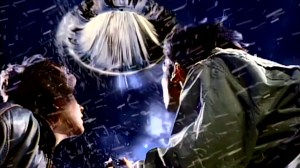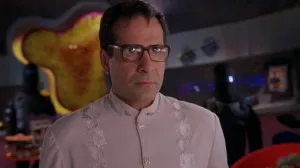If you’ve followed the Black Panther comics or saw the Marvel Cinematic Universe film about the Wakandan hero then you are likely familiar with Erik Killmonger as the villain of the story, a young man with a chip on his shoulder and a deep determination to take the throne of the African nation he feels left him out in the cold. But Killmonger is more than just an angry bad guy who feels he’s owed something and that is exactly what writer Bryan Hill is trying to convey in Killmonger #1.
Videos by ComicBook.com
The issue, which is the kickoff for a five-issue miniseries, tells you the ending up front: Killmonger’s attempted coup fails when he dies in battle after defeating the Black Panther in ritual combat. With that out of the way, the issue is free to tell Killmonger’s full story — the tale of the years between his tragic childhood and death.

It’s that focus on the inbetween years that help to shape Killmonger and bring him to a place where he is able to take on Black Panther that makes this issue a truly engaging story, and it does it not by building Killmonger from scratch, but by building on what readers already expect from the character: his anger. Fresh out of MIT, Killmonger is already focused on his goal, though at this point in his story it’s not going after the throne of Wakanda; it’s taking out Ulysses Klaue, the man who killed his father. Of course, that doesn’t go quite the way Killmonger planned, and he’s introduced to a group of assassins calling themselves Knight, Rook, and King whom he ultimately joins in order to get close to Klaue again via their employer, Kingpin.
While this introduction to the assassins sets up the story for the rest of the series and starts to build a framework for how Killmonger ultimately gets to Wakanda, it also starts putting together a part of Killmonger’s tale that is equally as important as the fighting and bloodshed, but one often not too deeply explored: his inner spiritual life. Woven through the pages of Killmonger #1 are spiritual lessons and teachings of his father’s Wakandan faith, Killmonger’s grip on those lessons made extra tight as he’s had to pick up his own heritage and story in bits and pieces as he navigates a world dominated by white people. There’s a particularly haunting moment that drives this sentiment home where, after being told his freedom is an early Christmas gift, Killmonger notes he’s not a Christian.

But it’s not just the nuanced and layered storytelling that paints a complete and deeply human portrait of Killmonger. The art in the book speaks just as strongly as the words on the page. There’s a sharp, almost harshness to the “present day” sequences underscoring the rage and pain Killmonger is driven by while scenes from his childhood are softer, almost fuzzy in some places, much in the way faded memories might appear in one’s mind. The scenes centered in Killmonger’s tenuous spirituality are stunning as well, crisp and clear while maintaining and ethereal quality that reminds the reader that whatever peace Killmonger is seeking remains just out of his reach.
Deftly written and beautifully drawn, Killmonger #1 may be one of the best comics this year as it takes a familiar story and gives it completely new dimension. It will be interesting to see exactly where the series takes us, but one thing is for certain: you’ll never see Killmonger the same way ever again.
Published by Marvel Comics
On December 5, 2018
Written by Bryan Hill
Art by Juan Ferreyra
Letters by VC’s Joe Sabino








